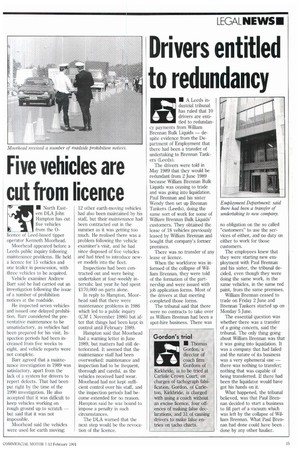Drivers entitled to redundancy
Page 23

If you've noticed an error in this article please click here to report it so we can fix it.
• A Leeds industrial tribunal has ruled that 10 drivers are entitled to redundancy payments from William Brennan Bulk Liquids — despite evidence from the Department of Employment that there had been a transfer of undertaking to Brennan Tankers (Leeds).
The drivers were told in May 1989 that they would be redundant from 2 June 1989 because William Brennan Bulk Liquids was ceasing to trade and was going into liquidation. Paul Brennan and his sister Wendy then set up Brennan Tankers (Leeds), doing the same sort of work for some of William Brennan Bulk Liquids' customers. They obtained the lease of 18 vehicles previously leased by William Brennan and bought that company's former premises.
There was no transfer of any lease or licence.
When the workforce was informed of the collapse of William Brennan, they were told of the formation of the partnership and were issued with job application forms. Most of the drivers at that meeting completed those forms.
The tribunal said that there were no contracts to take over as William Brennan had been a spot-hire business. There was no obligation on the so called "customers" to use the services of either, and no duty on either to work for those customers.
The employees knew that they were starting new employment with Paul Brennan and his sister, the tribunal decided, even though they were doing the same work, in the same vehicles, in the same red paint, from the same premises.
William Brennan ceased to trade on Friday 2 June and Brennan Tankers started up onMonday 5 June.
The essential question was whether there was a transfer of a going concern, said the tribunal. The only thing going about William Brennan was that it was going into liquidation. It was a company that had failed and the nature of its business was a very ephemeral one — there was nothing to transfer; nothing that was capable of being transferred. If there had been the liquidator would have got his hands on it.
What happened, the tribunal believed, was that Paul Brennan decided to start a business to fill part of a vacuum which was left by the collapse of William Brennan. What Paul Brennan had done could have been . done by any other haulier.




















































































































